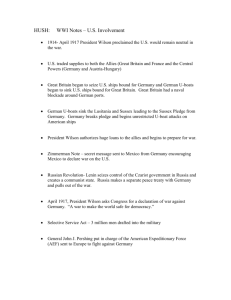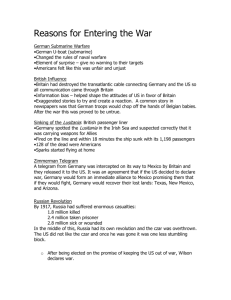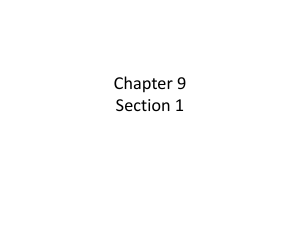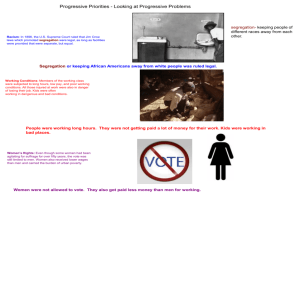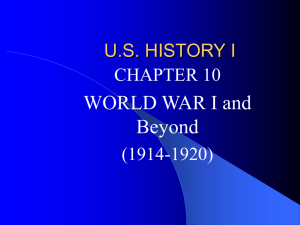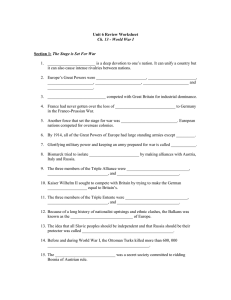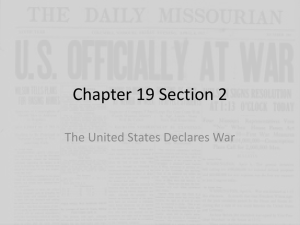WWI Test
advertisement
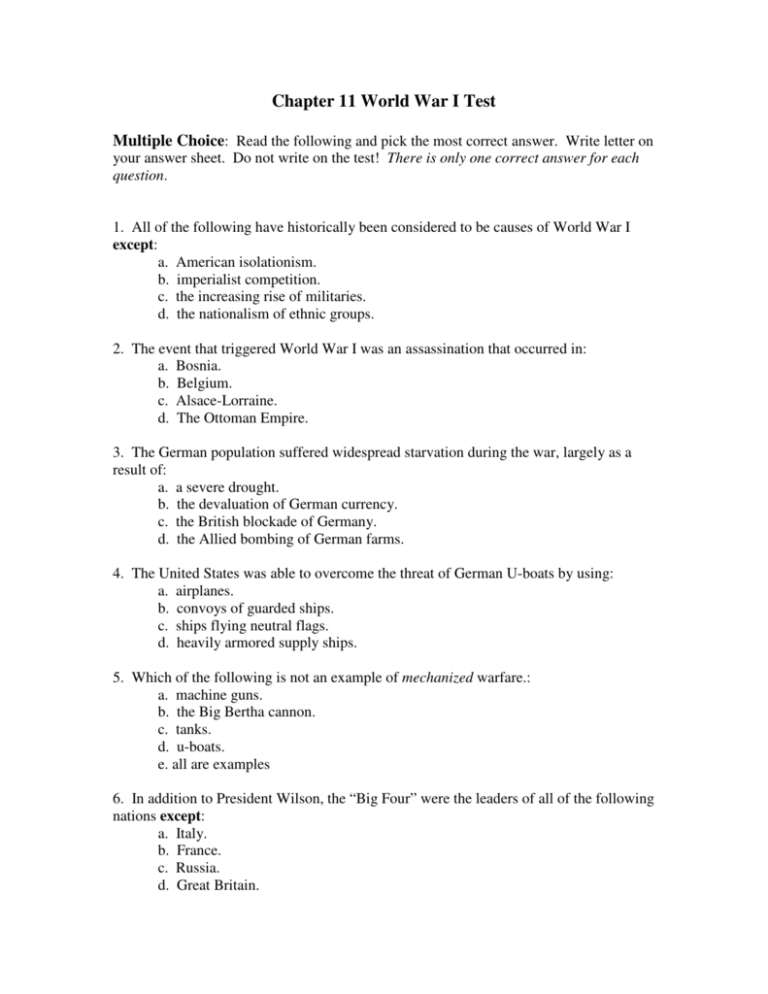
Chapter 11 World War I Test Multiple Choice: Read the following and pick the most correct answer. Write letter on your answer sheet. Do not write on the test! There is only one correct answer for each question. 1. All of the following have historically been considered to be causes of World War I except: a. American isolationism. b. imperialist competition. c. the increasing rise of militaries. d. the nationalism of ethnic groups. 2. The event that triggered World War I was an assassination that occurred in: a. Bosnia. b. Belgium. c. Alsace-Lorraine. d. The Ottoman Empire. 3. The German population suffered widespread starvation during the war, largely as a result of: a. a severe drought. b. the devaluation of German currency. c. the British blockade of Germany. d. the Allied bombing of German farms. 4. The United States was able to overcome the threat of German U-boats by using: a. airplanes. b. convoys of guarded ships. c. ships flying neutral flags. d. heavily armored supply ships. 5. Which of the following is not an example of mechanized warfare.: a. machine guns. b. the Big Bertha cannon. c. tanks. d. u-boats. e. all are examples 6. In addition to President Wilson, the “Big Four” were the leaders of all of the following nations except: a. Italy. b. France. c. Russia. d. Great Britain. 7. The U.S. Senate’s opposition to U.S. membership in the League of Nations centered on the belief that it would: a. lead to international instability. b. be a drain on American finances. c. interfere with free-trade agreements. d. drag the country into European conflicts. 8. Which of the following was not a method by which Americans conserved for the war effort? a. Meatless Mondays b. Liberty sandwiches c. Victory gardens d. Sweetless Saturdays 9. Which was part of the Fourteen Points? a. Germany was to pay reparations b. Austria-Hungary would become two distinct countries c. European colonies should be independent d. The country of Poland would be created 10. He was the millionaire businessman who took over the War Industries Board to make sure wartime production remained high. a. Bernard Baruch b. George Creel c. Frank Ferdinand d. Woodrow Wilson 11. All of the following, except one, are legitimate reasons for not entering World War I. Which of the following was not a reason to stay out of the war? a. no direct threat to American soil b. large percentage of German-Americans c. would end our trading with both sides d. it was a European war 12. Which of the following was a reason for entering World War I? a. it was a war of imperialism by capitalism b. we would lose the debts owed us by Britain if they lost c. Germany had been an ally for us during the Revolutionary War d. all of the above 13. Which of the following does not match the idea of imperialism? a. Britain in India b. Russia in Manchuria c. Germany in Belgium d. Serbia in Bosnia 14. Which of the following matches the idea of nationalism a. Jewish people wanting the state of Israel b. Muslims in India wanting to become Pakistan c. Serbians and Russians allying because they shared the same religion d. all of the above e. both a & c 15. All of the following were members of the Allies except a. Britain b. Italy c. Ireland d. Russia True or False: If the statement is true, write “true” on the line. If it is false, change the underlined word or words to make it true. Two points each. 16. Alvin York was the first U.S. flying “ace” in World War I. 17. The British blockade was responsible for more deaths than the German blockade 18. The Zimmermann note was a telegram suggesting an alliance between Germany and Russia. 19. Woodrow Wilson’s “Fourteen Points” speech described his war plan. 20. The Four Minute Men were men who were able to fight in a few minutes’ time. 21. The Great Migration brought hundreds of thousands of European refugees into Northern cities. 22. The Espionage and Sedition Acts were meant to stop Germans from entering the United States. 23. The Battles of the Marne and Somme were fought in Germany. 24. George Creel was the former Spanish-American War hero who led American doughboys in the AEF during WWI. 25. Women took over new roles and jobs stateside while the men were off fighting. Short Answer: Read the following and write in the correct answers on your answer sheet. Writing the number 2 in the bottom right corner of your answer sheet results in 3 extra points. Small spelling errors will not count 26-30. List five countries that were created by the Treaty of Versailles. 31-32. What were the names of the two major alliances during the war? 33-35. List three different examples of mandates that were created by the League of Nations- (remember mandates are countries that were controlled by another country) 36-40. List five weapons used during World War I that had either never been used before, or were used for the first time effectively during this war. Extra Credit: Name the country that each name below belongs in a. b. c. d. e. Georges Clemenceau Czar Nicholas II Vittorio Orlando Henry Cabot Lodge Gavrilo Princip

